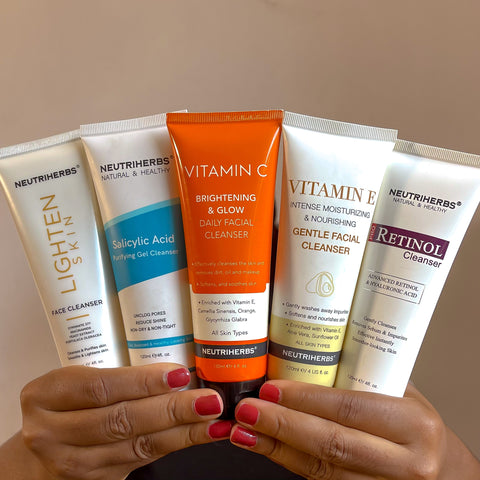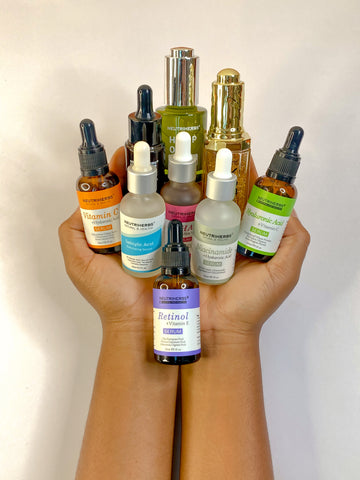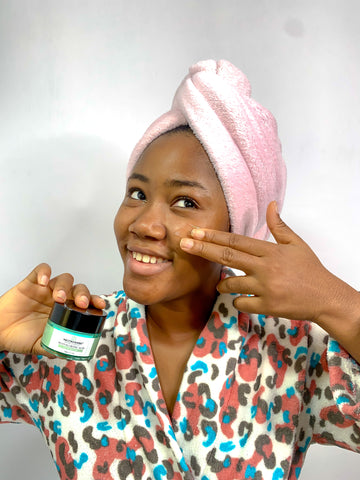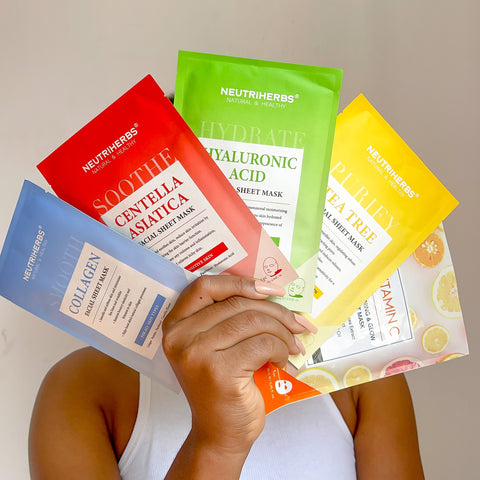
There is no one magic product anywhere in the world that can give you the skin of your dreams. More often than not, it takes several products working together as a team to address both your skin type and your range of concerns, from wrinkles and sun damage to clogged pores, dull skin, dehydrated skin, breakouts, redness and so on.
Skincare Routines is where the magic happens.
If you're not sure about how to put together a simple skin-care routine or you're looking to learn how to layer your skincare products, then this article might just be helpful.
What Is Your Skin Type?
Find the perfect routine for your skin type and concerns in just a few clicks with our new Routine Finder.
Knowing your skin type is the first step in building a skincare routine that works. This is because different skin types have different needs that require unique products.
If you’re unsure about your skin type, Here is how to determine skin type
Once the skin type is known, selecting the right products and developing a skincare routine is next step to addressing concerns.
The 4-Step Essential Skincare Regimen
In creating your first skin-care routine, keep it simple.
Our Essential Routine covers the 4 basic steps you need for healthy skin.
Step 1: Cleanse

First things first. The journey to radiant skin begins with a clean slate – quite literally. Cleansing is the first step of any skincare routine. It’s the process that rids your skin of dirt, oil, and impurities accumulated throughout the day or night
No beauty product can effectively work their magic without a clean face.
To make the most of your cleanse, gently massage the cleanser onto damp skin using circular motions for 60 seconds, then rinse off with lukewarm water.
How To Choose The Right Face Cleanser For Your Skin Type
Step 2: Treat

Next is serum.
Serums are highly concentrated formulas that address specific issues like fine lines, acne, dark spots, dull skin, etc.
That’s why serums tend to be one of the most expensive products when building your skincare routine! Even if you don’t have these specific concerns, an antioxidant serum is always a good choice to get you through the day and protect your skin.
Vitamin C is a common daytime brightening serum that most people can use without issue. Retinol serums are common for people who want to stimulate collagen production to prevent wrinkles or reduce acne and typically used at night. Niacinamide serums, on the other hand, focus on treating inflammation and acne and the list goes on (Click link below to learn about Neutriherbs serums and what each does)
Read More: Top Serums to Achieve Radiant Skin
Step 3: Moisturize

Next, use a moisturizer.
Now that your skin is cleansed and treated, it’s time to seal the deal with a dose of moisture.
Hydration is the key to maintaining your skin’s suppleness, preventing dryness, and supporting overall skin health – making no basic skincare routine complete without a moisturiser.
Opt for a lightweight, hydrating moisturiser like Neutriherbs 4D Hyaluronic Gel Moisturizer. This gem not only provides the essential moisture your skin craves but also forms a protective barrier against environmental aggressors like pollution.
You can also use this step as another opportunity to treat your skin targeting specific concerns
Here are some of the top skincare ingredients to know found in moisturisers and what they do:
Hyaluronic acid: Plumps skin and restores lost hydration.
Ceramides: Crucial for skin-barrier strength and overall health (and important for those with dry skin and eczema).
Vitamin C: Provides antioxidant protection and overall skin brightening.
Collagen: stimulates collagen production and boost elasticity
Vitamin E: Powerful antioxidant for protection, hydration and overall skin health.
Read Also: Pro Tips: How To Choose The Best Moisturizer For Your Skin Concern
Step 4: Protect

If you were to use only one thing for your skin, it has to be a sunscreen. Sun protection is the most important.
Opt for a sunscreen that is SPF 30 or higher, and apply it daily (even when it's rainy or you’re indoors or you’re inside your office/car with AC), This is because the sun still emits its ageing UVA rays, even when it’s not shining bright, These rays can still penetrate through and do some bad things to the skin.
Read More: SPF 30 or SPF 50: Which should you choose
When choosing which type of sunscreen to apply, there are two routes to go: Chemical or mineral-based (in some cases, both are combined into one hybrid formula).
Further Reading: Difference Between Mineral & Chemical Sunscreens
Once your skin is attuned to the basics, you can expand your Routine, adding additional products to target specific concerns.
To quickly and easily find the perfect routine for you, try our Routine Finder. It selects the right products for your skin type and skin concerns.
Additional Optional steps
1) Exfoliate
Once you have a basic routine down, you can begin to add in extra steps here and there, as needed. A good place to start is with exfoliation, adding it in as an additional step once or twice per week using alpha hydroxy acids (AHAs) or beta hydroxy acids (BHAs), which work in different ways to slough off excess buildup on the skin's surface.
Read more: Exfoliating acids: The Science of Beauty
Physical exfoliation, on the other hand, is just what it sounds like — manually sloughing away dead skin cells, excess oil, and buildup via a face scrub.
Read Also: How To Exfoliate Your Skin For Smooth Radiant Glowing Skin - Without Damage
Step 2: Toner
Once your canvas is clean, it’s time to bring balance back to your skin’s pH levels. This is where toning comes in.
See, whenever skin is touched by water or cleansed, it’s natural pH balance is automatically knocked out of sync. Toner helps to rebalance the skin and help purify, soothe, hydrate, and even keep blemishes at bay. It also helps ensure any lingering traces of make-up, and impurities are swept away.
Apply your toner using a cotton pad, and gently swipe it across your face as well as your neck - use it after cleanser but before serum.
See Also: Is A Toner Really Necessary? Benefits of Toners And Why It's a Must have
3) Apply Eye Cream
Eye creams hydrate the delicate under-eye area while keeping fine lines and wrinkles at bay. Use twice a day for best results. Neutriherbs's Vitamin C Brighten eye cream is our current favorite morning eye cream. It promises to support your skin's natural collagen production while brightening the look of dark circles thanks to its potent vitamin C.
Whereas Neutriherbs Eye Gel is best used at night to keep younger looking eyes.
4) Face Mask

Face masks are a great once-a-week addition to your skincare routine. While masks don't typically lead to transformative results in the way that a daily product can, they can offer a amazing temporary effect (so try them before a big event to reap the most benefits).
Seek out a face mask that's formulated to target whatever specific skin concerns you're facing that day; common examples include hydrating, clarifying, calming, and brightening masks.
Vitamin C Sheet mask - Brighten & Glow
Centella Asiatica Sheet mask - Calming and soothing
Tea Tree Oil Sheet Mask - Acne and oil control
Hyaluronic acid sheet mask - hydration
Collagen peptides sheet mask - firming and tightening.
5) Face oils
Face oils gives the skin a much needed boost of hydration and glow. Facial oil is neither a serum or moisturiser but have some shared similarities.
You can use facial oils after moisturisers but before sunscreen.
Five Popular Myths About Facial Oils
How To Layer Skincare The Right Way
With so many serums, lotions, creams, and toners being added in to our skincare routines, many of us are left with a big question: How exactly do you use all these things?
It turns out, there's a method. In fact, the order in which you apply skincare makes a significant difference to your skin. If you're not following that order, you may not get the best out of your routine.
So the order you place your skincare products matters.
In general, you want to apply products thinnest to thickest. This ensures that all the product is getting time in direct contact with your skin, and that no potent ingredients are wasted.
Cleanser >> Toner >> Serum >> Eye cream >> Moisturizer >> Face Oils >> Sunscreen
Whether you want to smooth wrinkles, fade brown spots or address other skin concerns, it all starts with a personalised skincare routine. Take the test, Discover yours.
Skincare Ingredients Combinations to Avoid
If you're using multiple active ingredients in your routine, you should always (always!) consult an expert or your vendor to be sure they can be safely paired. That said, here are some combos you can/cannot pair together.
Retinol and Vitamin C
The two ingredients work best at different pH levels (the measure of acidity), so using them together means they may not work as well
While you can use these ingredients at the same time at 30-45 minutes apart. You can simply use vitamin C in the morning (since it's an antioxidant that helps protect skin from environmental stressors) and retinol in the evening.
Vitamin C and Alpha Hydroxy Acids (AHAs)
Nope this pairing can cause irritation. So consider using vitamin C in the morning and AHAs in the evening.
Vitamin C and Benzoyl Peroxide/Salicylic Acid
Call them sworn enemies or star-crossed lovers — either way, these folks simply cannot be together. Benzoyl peroxide and salicylic acid, are ingredients commonly used to treat acne, and they cause vitamin C to degrade, or oxidize, rendering it useless. Womp, womp.
Salicylic Acid/Benzoyl Peroxide and Retinol
The acne avenger strikes again. Don't pair either salicylic acid or benzoyl peroxide with retinol, as they will "cancel each other out.
Salicylic Acid and Benzoyl Peroxide
Nope, don’t use together same time. Either this or that but never both at once.
Niacinamide and Retinol
Love at first sight
Vitamin C and Niacinamide
Thread cautiously, They both have different PH.
Collagen & Vitamin C
Can work
Retinol and Collagen
Maybe. Listen to your skin, though we’d always recommend they’re used on separate nights.
Important Beginner Tips
Less is more
You mustn’t use everything. Paring down your regimen and sticking to key, important active ingredients will serve you much better than doing too much. Stick to products that do not have too many ingredients and are fragrance-free, and try new products one by one so you can see how your skin adjusts.
Have patience
If a new skin-care routine doesn't seem like it's "working" right away, know that when it comes to skin care, patience is a must (and if any product promises immediate results, shine your eyes).
Give your skin a chance to get used to a product or active agent for at least two to three months before switching. The exception here, of course, would be if a skin-care product provokes any sort of irritation or allergic reaction — in which case, discontinue use right away or reduce frequency significantly.
Consistency is key
As with many things in life, consistency — going through the same skin-care routine steps every day, morning and night — is key to producing and maintaining real results. Bottom line: Trust in the process (and your own skin), and follow through with whatever plan you set out for yourself.
Find the perfect routine for you with our Routine Finder. Backed by 35+ years of extensive research we have 500+ routines specifically customised to deliver visible results.



Comment
So I started using your vitaminc brightening body wash and I can say for a fact u love what it does to my body after wash same with the vitamin c … the salicylic acid face wash I got is causing me more breakout and darkening my face what do I do and I jus got this products over two weeks from you guys .. the body oil I love it please can the quantity be increased.. … please what can I use in replacement of vitamin c for my face it irritates my face and gives me breakout so it been off my routine for a while regarding my face .. would wait for your response Thank you🙏